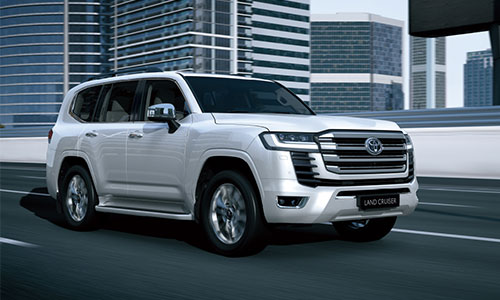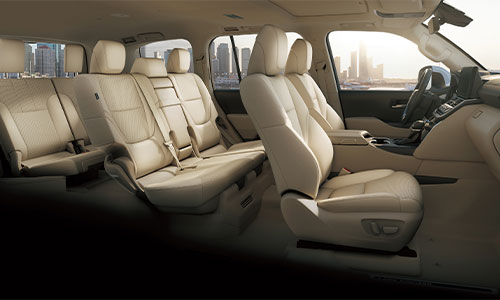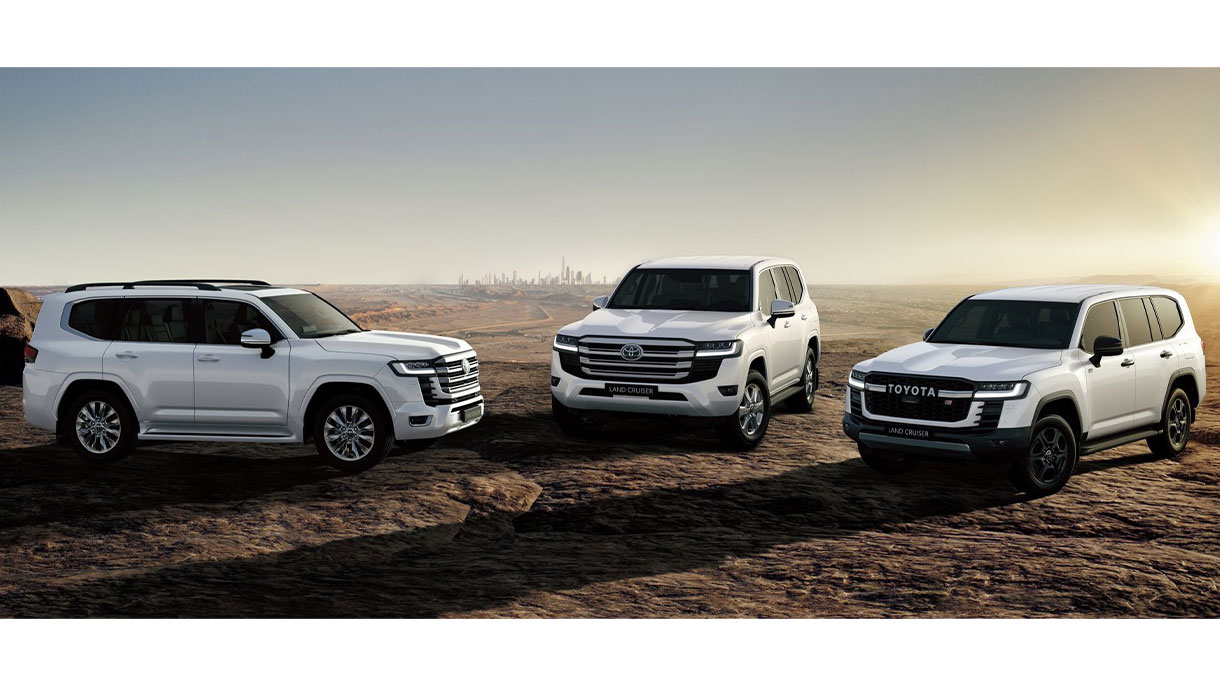New Toyota LandCruiser 300 Series
Redesigned flagship delivers unrivalled capabilities, on and off the road
V8-beating performance from a twin-turbo V6 diesel engine
Greater rigidity, lower weight, improved suspension and articulation
We're excited to reveal that Toyota has unveiled a giant leap forward in 4WD performance and technology with the next-generation LandCruiser making its global debut in the 70th anniversary year of the legendary nameplate.
Due in Australia in the final quarter of this year, the new LandCruiser 300 Series is the most capable LandCruiser ever, expanding its unrivalled reputation for on-road refinement, off-road performance, reliability and durability.
Everything Toyota has learnt in 70 years of building four-wheel-drive vehicles has gone into the design, development and manufacturing of the new LandCruiser.
The new-generation range features a dynamic new TNGA platform, more powerful engine, advanced driving technologies, improved suspension structure, increased articulation, fresh styling and the latest Toyota Safety Sense electronics.
These advanced attributes are combined with greater body rigidity, reduced mass, better weight distribution and a lower centre of gravity.
A newly developed 3.3-litre twin-turbo V6 diesel engine achieves V8-beating performance and flexibility, lifting power output to 227kW (+13.5 per cent) and torque to 700Nm (+7.7 per cent).
At the same time, it achieves noticeably lower fuel consumption and emissions, supported by a newly developed 10-speed Direct Shift automatic transmission and a kerb weight reduction across the range of more than 100kg.

New LandCruiser adopts a new TNGA-F platform while protecting its off-road core by maintaining a frame structure. Towing capacity is maintained at 3.5 tonnes.
Improved suspension performance with increased wheel articulation have further expanded LandCruiser's traditional capabilities in the toughest of conditions.
In a world first, an available new electronic Kinetic Dynamic Suspension System (e-KDSS) provides outstanding off-road performance through a larger suspension stroke achieved by effectively disabling the front and rear stabiliser bars.
Other firsts for a Toyota vehicle include a new Multi-Terrain Monitor that instantly displays obstacles as viewed from the driver's viewpoint and the adoption of a Multi Terrain Select function that automatically judges the road surface and selects the best driving mode.
New LandCruiser's ability to conquer diverse terrain was confirmed by extensive evaluation by in-house drivers with advanced or master-level technical skills and drivers who have participated in the Dakar Rally.
In keeping with LandCruiser's off-road heritage, vehicle dimensions including length, width, wheelbase and departure and approach angles are very close to the outgoing model, depending on the variant.
Features such as the bumper shape and placement of lighting components have been designed to help avoid damage during off-road driving.

Advanced safety features
The latest Toyota Safety Sense active safety package for LandCruiser incorporates a pre-collision system that helps avoid a collision or reduce damage by detecting pedestrians (daytime and night-time) and cyclists (daytime).
It can also detect oncoming vehicles at intersections and pedestrians crossing the street when the vehicle is turning in either direction.
An emergency steering and crash-avoidance function, which assists with steering and lane-keeping, is triggered when the driver performs a steering manoeuvre to avoid collision.

70-year history of LandCruiser
LandCruiser was launched on 1 August 1951 as the four-wheel-drive Toyota BJ, which demonstrated a high level of off-road performance in adverse environments.
It achieved fame by becoming the first vehicle to reach the sixth checkpoint of Japan's Mount Fuji - higher than anyone had thought possible in a 4WD.
In June 1954, the vehicle was renamed LandCruiser. It is Toyota's longest-serving nameplate, ahead of Corolla which began in 1966.
To the end of 2020, a cumulative total of approximately 10.4 million LandCruiser 4WDs have been sold in 170 countries and regions worldwide with demand now running at more than 300,000 vehicles a year.
The tally includes 1.12 million vehicles delivered to Australian customers - more than 10 per cent of all LandCruiser 4WDs ever sold. The totals include LandCruiser wagons, the heavy-duty 70 Series and LandCruiser Prado.
LandCruiser's success confirmed in Australia
In Australia, LandCruiser was discovered during development of the Snowy Mountains Hydro-Electric Scheme and its success was confirmed on the properties, mines and worksites of the Outback.
Toyota Australia Vice President Sales, Marketing and Franchise Operations Sean Hanley said the new LandCruiser once again raises the standard by which other 4WDs are judged for reliability, durability and off-road performance.
"Incredibly reliable and capable, LandCruiser enabled Toyota to establish its foothold in the world automotive market, evolving from a basic 4WD utility into an upmarket SUV," Mr Hanley said.
"It is an indispensable tool that supports our customers lives and livelihoods by enabling them to travel almost anywhere - and return - in safety and comfort.
"In our quest to make LandCruiser tougher and more capable than ever, we have taken feedback from customers from around the world. This includes extensive input from Australian owners who have experience in some of the world's harshest environments.
"The new LandCruiser range brings improved design and advanced new technologies that advance its performance in all conditions while enhancing its comfort, convenience and safety as a luxury vehicle."






